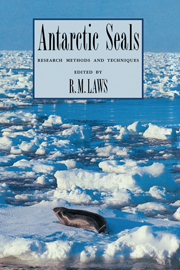Book contents
- Frontmatter
- Contents
- List of contributors
- Preface
- Introduction
- 1 Identification of species
- 2 Estimation of population sizes
- 3 Immobilization and capture
- 4 Marking techniques
- 5 Telemetry and electronic technology
- 6 Behaviour
- 7 Killing methods
- 8 Morphometrics, specimen collection and preservation
- 9 Genetic-based studies for stock separation
- 10 Collection of material for the determination of organochlorine and heavy metal levels
- 11 Age determination
- 12 Reproduction
- 13 Diet
- 14 Bioenergetics
- 15 Development of technology and research needs
- 16 Appendices
- Index
15 - Development of technology and research needs
Published online by Cambridge University Press: 05 February 2010
- Frontmatter
- Contents
- List of contributors
- Preface
- Introduction
- 1 Identification of species
- 2 Estimation of population sizes
- 3 Immobilization and capture
- 4 Marking techniques
- 5 Telemetry and electronic technology
- 6 Behaviour
- 7 Killing methods
- 8 Morphometrics, specimen collection and preservation
- 9 Genetic-based studies for stock separation
- 10 Collection of material for the determination of organochlorine and heavy metal levels
- 11 Age determination
- 12 Reproduction
- 13 Diet
- 14 Bioenergetics
- 15 Development of technology and research needs
- 16 Appendices
- Index
Summary
Introduction
In this chapter the suggested objectives of research and the types of research programmes needed to meet these objectives are outlined. They relate both to improved understanding of the basic biology of seals and to meeting the needs of two international conventions within the Antarctic Treaty System – the Convention for the Conservation of Antarctic Seals (CCAS) and the Convention for the Conservation of Antarctic Marine Living Resources (CCAMLR), which deals with all the component species of the Antarctic marine ecosystems (Appendices 16.5, 16.6). Typical research programmes are broadly framed so as to indicate where methodology and techniques particularly need to be improved. They are not static and will no doubt be subject to periodic review. The views of the Group of Specialists on Seals, and invited collaborators, on the main areas where developments of methods and techniques are needed are likewise as currently perceived. The emphasis may well change as existing technical problems are solved and new opportunities are grasped. It can be expected that new techniques will be developed and existing ones improved, particularly as computing, electronics, information technology and satellite instrumentation rapidly develop, making smaller but more effective equipment available to the Antarctic field scientist.
Objectives
The following objectives have emerged in discussion. The first is very broad and encompasses a wide diversity of topics in seal research.
- Type
- Chapter
- Information
- Antarctic SealsResearch Methods and Techniques, pp. 316 - 335Publisher: Cambridge University PressPrint publication year: 1993



